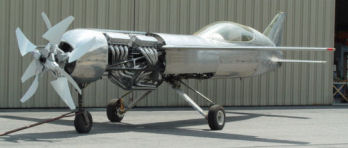TOMORROW'S RECORD BREAKER. RP4
TOMORROW'S RECORD BREAKER |
|
|
| The new RP-4 aircraft shown here, is being built to attack the World 3, 15 and 100 Kilometer Speed Records. |
| Engines: Two high performance V-8 engines power the RP-4, representing the best compromise among size, weight, power and availability. Tandem mounted, each engine drives its own propeller. The front engine drives the front prop directly and the rear engine, through gearboxes which bypass the front engine, drives the rear prop in contra rotation. Independent fuel and cooling systems allow for single engine operation. |
|
|
| Propellers: Utilizing NASA Unducted Fan Technology, two four-blade propellers with variable pitch hubs were constructed. The blades consist of 84 layers of prepreg carbon fiber and are 58 inches in diameter. |
| Cooling: During engine warm up, thermostats cycle engine water through the oil sump heat exchanger to quickly bring engine oil to operating temperature. Once up to temperature, the thermostats then direct engine water to a series of aluminum tubes within the wing. These tubes are immersed in 50 gallons of water which carry engine heat to the wing surfaces which are cooled by the slipstream. Separate series of tubes are provided for each engine enabling autonomous cooling of either engine. Wing water can be diverted through an auxiliary radiator located in the tail cone for cooling on the ground if needed. The forced induction systems generate high inlet temperatures and induction air is directed through evaporators charged by air conditioning compressors. This system also provides conditioned air to the cockpit. |
| Fuel: A 100 gallon fuel cell below the wing supplies fuel to engine-driven pumps which feed the injectors. |
| Gear: All gear retract aft into the fuselage. The main gear articulates as it retracts holding the wheels parallel to the fuselage throughout retraction. |
| Wing: The RP-4 wing is one of the most complex ever constructed. Less than 3 inches at its thickest point, it nevertheless contains flaps and ailerons as well as 200 feet of tubing and nearly 400 fabricated fittings and connectors which comprise the cooling systems. |
|
|
| Fuselage: Built entirely of large diameter chrome moly tubing, the fuselage is skinned in 60 thousandths aluminum and is 31 inches in diameter. |
| Empennage: The vertical and horizontal stabilizers are, like the wing, both riveted and bonded together. The vertical stabilizer houses the nav/comm antennas as well as pitot and cockpit ventilation systems. |
| Performance: The RP-4 is designed to be a high performance aircraft. |
| Eric Hereth, master machinist, fabricator and welder, built all components of this remarkable aircraft from scratch, with the exceptions of engine long blocks, wheels, and hydraulic components. |
| Jerry Baer assisted in all phases of construction. |
| Editor: The RP-4 is the brainchild of David Rose who owns, designed, and will fly this aircraft. Barnstormers eFLYER will provide video of the first flight. Submit Your Comments. |
technorati tags:rp8, barnstormers, aircraft, airplane, speed, record
Blogged with Flock



